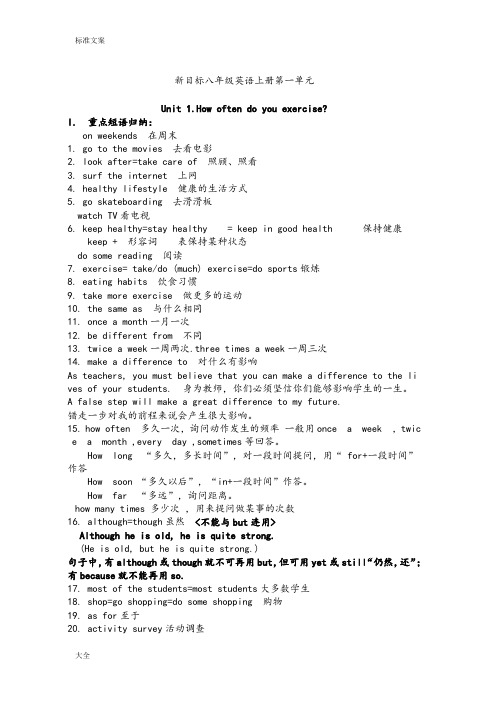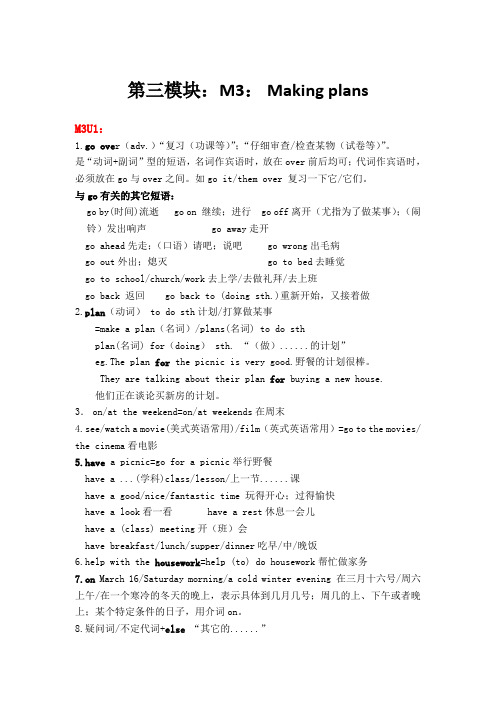work do和help区分
- 格式:ppt
- 大小:77.50 KB
- 文档页数:2

新目标八年级英语上册第一单元Unit 1.How often do you exercise?I. 重点短语归纳:on weekends 在周末1. go to the movies 去看电影2. look after=take care of 照顾、照看3. surf the internet 上网4. healthy lifestyle 健康的生活方式5. go skateboarding 去滑滑板watch TV看电视6. keep healthy=stay healthy = keep in good health 保持健康keep + 形容词表保持某种状态do some reading 阅读7. exercise= take/do (much) exercise=do sports锻炼8. eating habits 饮食习惯9. take more exercise 做更多的运动10. the same as 与什么相同11. once a month一月一次12. be different from 不同13. twice a week一周两次.three times a week一周三次14. make a difference to 对什么有影响As teachers, you must believe that you can make a difference to the li ves of your students. 身为教师,你们必须坚信你们能够影响学生的一生。
A false step will make a great difference to my future.错走一步对我的前程来说会产生很大影响。
15.how often 多久一次,询问动作发生的频率一般用once a week ,twice a month ,every day ,sometimes等回答。

第三模块:M3: Making plansM3U1:1.go ove r(adv.)“复习(功课等)”;“仔细审查/检查某物(试卷等)”。
是“动词+副词”型的短语,名词作宾语时,放在over前后均可;代词作宾语时,必须放在go与over之间。
如go it/them over 复习一下它/它们。
与go有关的其它短语:go by(时间)流逝 go on 继续;进行 go off离开(尤指为了做某事);(闹铃)发出响声 go away走开go ahead先走;(口语)请吧;说吧 go wrong出毛病go out外出;熄灭 go to bed去睡觉go to school/church/work去上学/去做礼拜/去上班go back 返回 go back to (doing sth.)重新开始,又接着做2.plan(动词) to do sth计划/打算做某事=make a plan(名词)/plans(名词) to do sthplan(名词) for(doing) sth. “(做)......的计划”eg.The plan for the picnic is very good.野餐的计划很棒。
They are talking about their plan for buying a new house.他们正在谈论买新房的计划。
3.on/at the weekend=on/at weekends在周末4.see/watch a movie(美式英语常用)/film(英式英语常用)=go to the movies/ the cinema看电影5.have a picnic=go for a picnic举行野餐have a ...(学科)class/lesson/上一节......课have a good/nice/fantastic time 玩得开心;过得愉快have a look看一看 have a rest休息一会儿have a (class) meeting开(班)会have breakfast/lunch/supper/dinner吃早/中/晚饭6.help with the housework=help (to) do housework帮忙做家务7.on March 16/Saturday morning/a cold winter evening 在三月十六号/周六上午/在一个寒冷的冬天的晚上,表示具体到几月几号;周几的上、下午或者晚上;某个特定条件的日子,用介词on。

非谓语动词判断方法非谓语动词判断方法 1如下:一般式:不定式的一般式所表示的动作与谓语动词动作同时发生或发生在谓语动词动作之后。
进行式:不定式的进行式所表示的动作与谓语动词动作同时发生。
完成式:不定式的完成式表示的动作发生在谓语动词动作之前。
非谓语动词三种形式及用法:非谓语动词,又叫非限定动词,非谓语动词是指在句子中不是谓语的动词,主要包括不定式、动名词和分词(现在分词和过去分词),即动词的非谓语形式。
非谓语动词除了不能独立作谓语外,可以承担句子的其他成分。
以do为例,动词不定式的构成如下:例如:It's nice to meet you.很高兴见到你。
He seems to know a lot. 他看起来懂得很多。
We plan to pay a visit. 我们计划去参观。
He wants to be an artist. 他想成为一个艺术家。
The patient asked to be operated on at once. 病人要求马上手术。
The teacher ordered the work to be done. 老师要求完成工作。
2、进行式:不定式的进行式所表示的动作与谓语动词动作同时发生,例如:The boy Ptended to be working hard. 男孩假装工作得很努力。
He seems to be reading in his room. 看起来他正在他的房间里面读书。
3、完成式:不定式的完成式表示的动作发生在谓语动词动作之前,例如:I regretted having told a lie. 我后悔我说谎了。
I happened to have seen the film. 我偶然看过这部电影。
He is pleased to have met his friend. 他很高兴能遇上他的朋友。
非谓语动词判断方法 2总结是对取得的成绩、存在的问题及得到的经验和教训等方面情况进行评价与描述的一种书面材料,它在我们的学习、工作中起到呈上启下的作用,因此我们要做好归纳,写好总结。

后接不定式的动词口诀后接不定式的动词后接不定式的动词口诀后接不定式的动词后接不定式的动词下列动词或词组都可以用不定式:afford aim agree arrange ask decidebother care choose demand desire determineelect endeavor hope fail help learnlong 渴望 mean manage offer plan pretendrefuse tend undertake expect hate intend例如:The driver failed to see the other car in time、司机没能及时看见另一辆车。
He offered to help me、他表示愿意帮助我。
需要省略to的不定式的情况有:1)情态动词后。
2)使役动词 let, have, make后,感官动词 see, watch, look at, notice , observe, hear, listen to, smell, feel, find 等后。
注意:被动语态中不能省去to。
例如:I saw him dance、我看见他跳舞。
=He was seen to dance、The boss made them work the whole night、老板让他们整夜干活。
=They were made to work the whole night、3) would rather,had better句型后4)Why… / why no…句型后5) help 后可带to,也可不带to, help sb do sth:6) but和except后。
but前是实义动词do时,后面出现的不定式不带to。
比较:He wants to do nothing but go out、他只想出去玩。
He wants to believe anything but to take the medicine、除了吃这药,他什么都信。

新目标八年级英语上册第一单元Unit 1.How often do you exercise?I. 重点短语归纳:on weekends 在周末1. go to the movies 去看电影2. look after=take care of 照顾3. surf the internet 上网4. healthy lifestyle 健康的生活方式5. go skateboarding 去滑滑板watch TV看电视6. keep healthy=stay healthy = keep in good health 保持健康keep + 形容词表保持某种状态do some reading 阅读7. exercise= take/do (much) exercise=do sports锻炼8. eating habits 饮食习惯9. take more exercise 做更多的运动10. the same as 与什么相同11. once a month一月一次12. be different from 不同13. twice a week一周两次.three times a week一周三次14. make a difference to 对什么有影响As teachers, you must believe that you can make a difference to the lives of your st udents.身为教师,你们必须坚信你们能够影响学生的一生。
A false step will make a great difference to my future.错走一步对我的前程来说会产生很大影响。
15. how often 多久一次,询问动作发生的频率how many times 多少次,用来提问做某事的次数16. although=though虽然 <不能与but连用>Although he is old, he is quite strong.(He is old, but he is quite strong.)句子中,有although或though就不可再用but,但可用yet或still“仍然,还”;有because就不能再用so.17. most of the students=most students大多数学生18. shop=go shopping=do some shopping 购物19. as for至于20. activity survey活动调查21. do homework做家庭作业22. do house work做家务事23. eat less meat吃更少的肉24. junk food垃圾食物25. be good for 对什么有益26. be bad for对什么有害27. want to do sth 想做某事28. want sb to do sth想某人做某事29. try to do sth 尽量做某事30. come home from school放学回家31. of course=certainly=sure当然32. get good grades取得好成绩33. some advice 一些建议some advice 中的advice 是不可数名词 a piece of advice 一则建议 give advice 提出建议take one’s advic e 采纳或听从某人的建议4. help sb to do sth帮助某人做某事=help sb with sth35. a lot of vegetables=many vegetables许多蔬菜36. hardly= almost not几乎不 hardly ever很少,几乎不,从不37. keep/be in good health保持健康38.your favorite program你最喜欢的节目39. Animal World 动物世界40. play soccer踢足球41.every day 每天every day 与 everyday1. every day 作状语,译为“每一天”。

Unit 1 Can you play the guitar◆短语归纳1. play chess 下国际象棋2. play football 踢足球3. play the guitar 弹吉他4. play the violin 拉小提琴5. call sb. at给某人打电话6. want to do 想要做某事7. make friends with sb 和某人结交朋友8. play games 做游戏9 d o kung fu 练(中国) 功夫10 tell stories 讲故事11. on the weekend/on weekends 在周末12. speak English/Chinese 说英语/汉语13. English club 英语俱乐部14. talk to 跟…说15.talk with sb 和..谈话◆用法集萃1.1)play +棋类/球类下……棋,打……球(不加任何冠词)2)play the +西洋乐器弹/拉……乐器(加定冠词the)3)Play 后面跟玩具或者其他名词市,一般加介词with 例如:Dolphins can play with a ball. 海豚会玩球。
Play with sb. 和某人玩2. be good at doing sth.= do well in doing sth. 擅长做某事3. be good with sb=get on well with sb . 和某人相处地好4. need sb. to do sth. 需要某人做某事5. can + 动词原形能/会做某事6. a little + 不可数名词一点儿……7. join the …club 加入…俱乐部8. like to do sth. =love to do sth. 喜欢/喜爱做某事like doing sth= love doing sth9. What about sth/doing sth 做某事怎么样例如:What about having a rest?10.Let’s do sth 让我们做某事(let 后出现的动词用动词原形)例如:Let’s go swimming.◆重难点注释一.Can 的用法1. 表示能力She can sing that song in English. 她能用英文唱那首歌。
复合宾语“主语+vt.+宾语+宾语补足语”是英语中的一个基本句型。
宾语和它的补足语有逻辑上的主谓关系。
下面介绍几个典型动词后面宾语补足语的形式:1.Make+复合宾语:补足语有四+1种形式,即:n.;do(不带to的不定式);adj.;-ed;句子。
Eg:We made him monitor of our class.The teacher made us write a composition.I saw him come in.I saw him coming in.He was seen to come in by me.The teacher’s explanation made the text easier to understand. The teacher’s explanation made it easier to understand the text.His English is so poor that he can’t make himself understood. The speaker raised his voice to make himself heard.He introduced himself to make himself known.His parents managed to make him examined in the hospital.“Once people think you are a liar,it's hard for you to make yourself believed,no matter what you'll say.” father warned his son.The shop owner will make the ordered TV sets delivered to the customers today.I need to make my car repaired.我需要修理我的车。
加to do 的动词attempt企图enable能够neglect无视afford负担得起demand要求long渴望arrange安排destine注定mean意欲,打算begin开场expect期望omit忽略,漏appear似乎,显得determine决定manage设法cease停顿hate憎恨,厌恶pretend假装ask问dread害怕need需要agree同意desire愿望love爱swear宣誓volunteer志愿wish希望bear承受endeavor努力offer提供beg请求fail不能plan方案bother扰乱;烦恼forget忘记prefer喜欢,宁愿care关心,喜欢happen碰巧prepare准备decide决定learn学习regret抱歉,遗憾choose选择hesitate犹豫profess说明claim要求hope希望promise承诺,允许start开场undertake承接want想要consent同意,赞同intend想要refuse拒绝decide决定learn学习vow起contrive设法,图谋incline有…倾向propose提议seek找,寻觅try试图2)下面的动词要求不定式做宾补:动词+宾语+动词不定式ask要求,邀请get请,得到prompt促使allow允许forbid制止prefer喜欢,宁愿announce宣布force强迫press迫使bride 收买inspire鼓舞request请求assist协助hate憎恶pronounce断定,表示advise劝告exhort告诫,勉励pray请求authorize授权,委托help帮助recommend劝告,推荐bear容忍implore恳求remind提醒beg请求induce引诱report报告compel强迫invite吸引,邀请,summon传唤command命令intend想要,企图show 显示drive驱赶mean意欲,打算train训练cause引起instruct指示require要求deserve应受leave使,让tell告诉direct指导like喜欢tempt劝诱entitle有资格order命令warn告诫enable使能够need需要urge鼓励,力说encourage鼓励oblige不得不want想要condemn指责,谴责lead引起,使得teach教entreat恳求permit允许wish希望(2)有少数动词只能用动名词作宾语acknowledge成认,自认cease 停顿mention说到,讲到admit 成认tolerate忍受dislike不喜欢,讨厌advocate:提倡,主complete完成dread可怕appreciate 感谢,欣赏confess坦白endure忍受avoid防止contemplate细想enjoy享有,喜爱bear忍受defer拖延envy嫉妒can’t help不禁delay延迟escape逃跑,逃避can’t stand受不了deny否认excuse借口consider 考虑detest嫌恶fancy梦想,爱好favor 造成,偏爱mind 介意repent悔悟figure描绘,计算miss错过resent怨恨finish完成,完毕不得pardon原谅,饶恕resist抵抗,阻止forgive原谅permit 允许resume恢复imagine设想postpone延迟,延期risk冒险involve卷入,包含practise 实行,实践suggest建议hate讨厌prevent阻止save营救,储蓄keep保持quit放弃停顿stand坚持,忍受loathe非常讨厌,厌恶recall回想例如:I appreciate having been given the opportunity to study abroad two years ago.我很感谢两年前给我出国学习的时机。
1.概述动词不定式to do是动词的一种非谓语形式,在句中不能单独作谓语。
动词不定式具有动词的性质,它可以有自己的宾语和状语,从而构成动词不定式短语。
它还可以有形式的变化,即一般式、进行式、完成式和完成进行时,主动式和被动式。
同时,动词不定式也具有非动词的性质,相当于一个名词、形容词或副词,可以在句中担任主语、宾语、宾语补足语、表语、定语和状语。
2. 动词不定式的构成动词不定式是由不定式符号to+动词原形构成,在某些情况下to 也可省略。
主动形式被动形式否定式一般式to do/ to be done/ not to do/ not to be done进行式to be doing/ not to be doing完成式to have done/ to have been done/ not to have (been) done完成进行式to have been doing/ not to have been doing2.1不定式的一般式to do/ to be donenot to do/ not to be done不定式的一般式表示的动作通常与主要谓语的动作同时或几乎同时发生,或是在它之后发生。
He appears to be very happy. 他看起来好像很高兴。
(同时发生)To catch the train, we'd better hurry to the station by taxi.为了赶上火车,我们最好赶紧乘出租车去车站。
(赶火车发生在到站之后)2.2不定式的进行式to be doing/ not to be doing不定式的进行式表示正在进行的或与谓语动词同时发生的动作。
It happened to be raining when I got there. 我到达那里的时候,天碰巧在下雨。
I'm glad to be traveling with you. 我很高兴和你一起旅游。
英语五种基本句型五种基本句型见下表(S=主,V=谓,O=宾,P=表,IO=间宾,DO=直宾,OC=宾补):种类句型例句第1种S+V We work. (不及物)第2种S+V+O He plays (及物) the piano.第3种S+V+P We are(系动词) students.第4种S+V+IO+DO She gave(及物) me a pen.第5种S+V+O+OC He made(及物) the boy laugh.一、第1种句型:S+V(主语+不及物动词)1、Birds fly. 鸟飞。
主语+谓语(不及物动词)2、He runs in the park. 他在公园里跑。
主语+谓语+地点状语(不及物动词)此句型是“主语+不及物动词”构成句子的主体部分。
因为是不及物动词,后面当然不能带宾语了,但是可以有状语来修饰。
例如上面例句中的in the park就是地点状语。
3、Class begins.(begin在句中是不及物动词)上课了。
比较:We begin our class at eight. 我们八点钟开始上课。
只能当不及物动词的词(必背!):sleep 睡觉walk 步行swim 游泳happen(take place)发生go去come来work 工作laugh 笑stay呆在……arrive 到达4.中英文互译1.He is running.2.He is running on the ground.3He is running on the ground with his classmates. 4.They arrived. 5.They arrived. Here.6.They arrived here at 10:00 yesterday morning.7.They are talking. 8. .They are talking happily. 9They are talking happily in the office.10 I work every day. 11They study hard. 12.He sings well. 13.She runs very slowly.15The kites fly high. 16.他画画画得好。